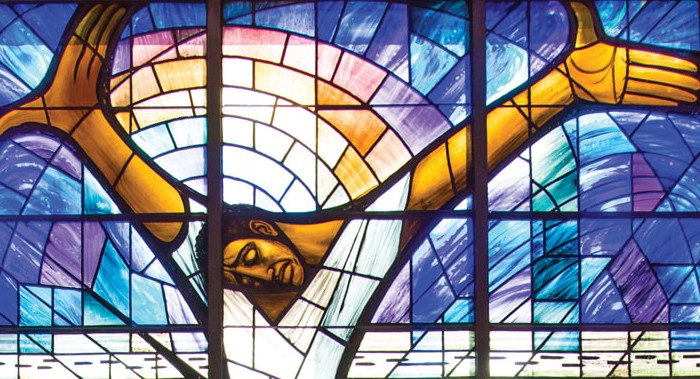Whites must go beyond acknowledging their part in racism to recognizing how they have been traumatized by it, a noted racial healing advocate said during a three-day symposium on race at Baylor University’s Truett Seminary.
“Part of the wound is the capacity to stay unconscious, to have been given a narrative that your way is the right way and the only way,” said Catherine Meeks, executive director of the Absalom Center for Racial Healing in Atlanta.
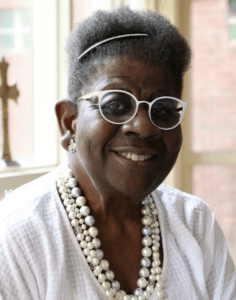
Catherine Meeks
“To go through the world thinking that the world is somehow constructed to favor you is a serious wound because it leaves you thinking your unconsciousness is justified. When you talk to someone in that state, they have no capacity to hear what you are saying.”
Meeks joined numerous high-profile experts on racism and Christianity for “Do We Want to Be Healed? Racism in the White Church.” The Feb. 17-19 event featured more than a dozen online and in-person sessions on topics ranging from racial healing, to white evangelicals on race and the role of Black gospel music in racial healing.
The event was organized by BNG columnist Greg Garrett, professor of English at Baylor and recipient of a Baugh Foundation grant for research on race and media.
Denial impedes healing
Racial healing is impeded when whites respond with denial and anger to the suggestion that something in themselves and their world must change, Meeks said. Hostility can be especially strong when they feel church and nation are threatened.
“White people need to separate selves as human beings from their notion of what the country is. Just step back. Whatever happens in the country is external to you,” Meeks said. “Let’s get grounded internally and into a sense of self and being that is not so connected to external realities.”
The grounding instead needs to be in Jesus Christ, the gospel and in an acceptance that disruption is a necessary part of racial healing, she said, adding that focusing on the kingdom of God instead of empire can free white people from feeling the need to defend and reinforce existing cultural and political structures.
“White folks don’t need to feel guilt and shame because those energies don’t lead to creativity.”
Legislative efforts seeking to bar teachers from teaching students “anything that disturbs them,” Meeks said, derive from the white assumption that “you can go through life without being disturbed” and that “the world belongs to me and is supposed to work for me.”
Prayer can help people accept that “there is a God bigger than me and that it doesn’t all begin and end with me.”
Yet white people also should avoid beating themselves up over racism, she said. “White folks don’t need to feel guilt and shame because those energies don’t lead to creativity.”
Disparity baked in to evangelicalism
But it is necessary to acknowledge the privilege that comes with being white, Kristin Du Mez and Beth Allison Barr said in beginning their Feb. 18 “White Evangelical Christianity” conversation.
“Seeing the attention I have gotten has made me even more sensitive to the fact that race is always a factor and that white is not normative,” said Barr, a Baylor history professor and author of The Making of Biblical Womanhood: How the Subjugation of Women Became Gospel Truth. “A Black woman with the same book may not get the same attention.”
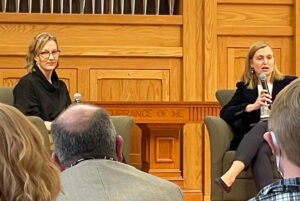
Kristin Du Mez (left) and Beth Allison Barr
That racial disparity derives in large part from the whiteness baked into the very core of evangelical Christianity, said Du Mez, professor of history at Calvin University and author of Jesus and John Wayne: How White Evangelicals Corrupted a Faith and Fractured a Nation.
Definitions of evangelicalism — including the Bebbington quadrilateral’s focus on Scripture, the Cross, being born again and activism — are laden with white theological and political assumptions about the Bible, Christ, conversion and outreach, Du Mez said.
This is why many Black Protestants, who would check the quadrilateral’s boxes, do not identify as evangelicals, she added. “They know there is so much more to evangelicalism than just those theological points.”
Du Mez said she describes evangelicalism as a series of interconnected networks, institutions and consumer culture that conceive the boundaries of the movement racially. “And spoiler alert: they are imagined as white.”
Litmus tests of faith like the Chicago Statement on Biblical Inerrancy have been another way white evangelicals have sought to control who is, and isn’t, a true Christian, Barr said. “The boundaries they are drawing are putting themselves at the center and excluding not only women but anyone who does not look like them.”
A faith defined by whiteness
The repercussions of a faith defined by whiteness was evident not only in the slavery and Jim Crow eras, but also in the response to the rise of the Black Lives Matter movement, said Robert P. Jones, author of White Too Long: The Legacy of White Supremacy in American Christianity and founder and CEO of Public Religion Research Institute.
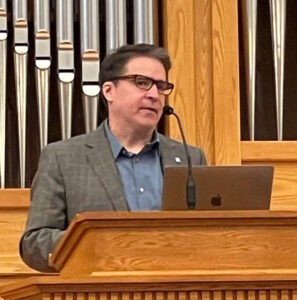
Robert P. Jones
White rejoinders such as “all lives matter” and “blue lives matter” demonstrate that white evangelicals were unable to comprehend what was happening in the moment, Jones said during a Feb. 19 session.
“Do we want to heal? Many of us have been given a resounding ‘no’ to that question. ‘No, actually we’re fine,’” he asserted.
The concept of “racial reconciliation” is often code for “let’s get over it” with many Baptists and other evangelicals viewing racism only as a “personal problem of individual hearts, not a problem built into the culture,” Jones said.
Yet the presence of racially segregated sections in every American city bear witness to racism as a systemic issue, he added. As do polling results, which consistently show whites favoring Confederate statutes and racially oppressive criminal justice and economic policies, while at the same time claiming to harbor “warm feelings” toward people of color.
Whites seem to be saying, “If I tell myself that me and white Jesus are OK, nothing else matters. I don’t even have to think about the injustice swirling around,” Jones said.
Gospel music at the root of change
The spirituals that sustained Black people from the slave era onward may hold the key to racial healing — even for whites, said Robert Darden, a Baylor communications professor and director of the university’s Black Gospel Music Restoration Project.
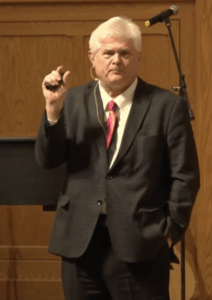
Bob Darden
“Gospel music, perhaps more than any other single entity, has been at the root of change in this country,” said Darden, author of People Get Ready!: A New History of Black Gospel Music.
Veterans of the Civil Rights movement Darden interviewed often could not recall the sermons preached to inspire the movement, even when delivered by the likes of Martin Luther King Jr. But they were invariably able to recall which songs were sung during marches and protests.
“Every one of them held onto the hope and power those songs had given them,” Darden reported.
The genre’s power derives neither from entertainment value nor strictly from faith, he said. “But it is rooted in the pain and triumph of an entire nation of people, giving it the ability to cut through many of the barriers keeping us apart.”
Slaves in America were stripped of everything except song, he said. “All they had left was singing, and they convinced their overseers: if you let us sing, we will make you more money.”
The overtly religious language of the songs obscured cadences and lyrics of protest and freedom. “Every spiritual we know of had a double voice, one for the overseers and one for the people in the inner circle,” Darden explained.
By initially listening to Scripture readings outside white churches and the doors and windows of plantation mansions, slaves “cobbled together a Christianity as close to the first century as we have ever seen” and expressed it in their singing, he said.
The power of this music is further evidenced in the role it played throughout the Jim Crow and Civil Rights eras and up through the Black Lives Matter movement. Songs such as We Shall Overcome were reportedly heard sung at the fall of the Berlin Wall and during the Tiananmen Square protests in China, Darden added.
The only way white people can experience the power of Black gospel music is to sing it with the people who carry on its tradition, Darden said. “My thesis is that to understand how this music transforms lives and transforms nations, go to where this music is sung. Sing these songs with a Black congregation and let the Holy Spirit … fill you.”
Related articles:
Greg Garrett, Baylor prof and BNG columnist, awarded Baugh grant for research on race and media
Baylor’s Black Gospel Archive and Listening Center now open to the public
BNG column sparks Thanksgiving Twitter war of words between complementarians and two female scholars

